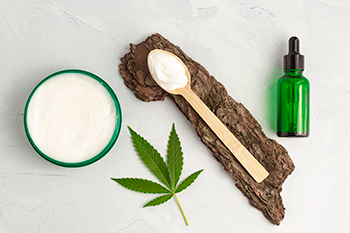Can CBD help people with psoriasis find relief?
Jason E. Hawkes, an associate professor of dermatology at UC Davis Health, has been seeing more patients with psoriasis who are interested in cannabidiol (CBD) as an alternative or complementary treatment for their condition.

In this Q&A, he answers questions on the safety and effectiveness of using CDB for treating psoriasis or reducing its symptoms.
What is psoriasis?
Psoriasis is a chronic, inflammatory condition linked to the body’s immune system. When immune cells become dysregulated in psoriasis patients, they cause red, scaly patches of skin and inflammation throughout the body.
Up to 30% of patients with psoriasis also have psoriatic arthritis with symptoms such as morning stiffness, fatigue, swollen fingers and toes, pain in joints, and nail changes. Psoriasis patients also have an increased risk for other conditions such as heart disease, stroke, kidney disease, sleep and respiratory problems, depression and anxiety, high blood pressure, diabetes and obesity.
What is CBD and can it help with psoriasis?
Cannabis is a plant that contains more than 80 biologically active chemical compounds known as cannabinoids, which have a range of biological activities in the body, including anti-inflammatory, antioxidant, and psychological effects.
Despite many very effective topical and systemic treatments for psoriasis, many patients still suffer from chronic itching and pain. They also face the stigma and psychosocial consequences of having a highly visible skin condition. It is, therefore, not surprising that patients affected with this disease have sought relief via a variety of alternative treatment options, including cannabis-based products like CBD.
The medical community has just barely scratched the surface with regards to the potential benefits and risks of cannabis-derived products. The biochemical impact of CBD on the body needs to be carefully considered. Their effects are determined by many variables, including the delivery method to the body (topical application, inhalation, oral ingestion), dose or concentration of the cannabinoid, or the specific chemical(s) isolated from a particular plant strain.
Yet, it is a very reasonable assumption that the potential beneficial psychological (e.g. anxiety reduction) and anti-inflammatory effects of cannabinoids could help alleviate the disease burden associated with psoriatic disease.
How do cannabinoids like CBD affect the body?
Like CBD, delta-9-tetrahydrocannabinol (THC) is a common cannabinoid isolated from the cannabis plant. However, CBD and THC have distinct properties and vary dramatically in their observed effects on the human body. Both compounds can work in place of the body’s own cannabinoid system – known as the endocannabinoid system – wherein THC and CBD interact with receptors in specific tissues or the nervous system to mediate a broad range of physiological effects like reduced inflammation, itching and pain relief, increased ability to sleep, appetite stimulation, and decreased anxiety.
For psoriasis patients with specific complaints such as pain, itching, or trouble sleeping, cannabis-derived products might help reduce the negative impact these symptoms have on their life. Ongoing medical research can help tease out the complex mechanisms by which cannabinoids like CBD or THC impact health and modulate biological systems such as the immune response.
In general, CBD appears to retain many of the biological effects of THC, without the “high” most people associate with THC or marijuana. This key difference has led many companies or research groups to study and develop pure CBD products that may be more desirable for patients who wish to avoid or may not tolerate the stronger psychoactive effects of THC-based products. This difference has also made CBD a popular choice among consumers who are first-time or inexperienced users of cannabis-based products.
Are CBD products safe for psoriasis patients? What are the risks of using CBD products?
The risks of CBD and other cannabis-derived products in patients with psoriasis and other inflammatory skin diseases have not been carefully studied. This is an unmet need that deserves ongoing attention and research. Nevertheless, prior clinical studies are informative and suggest that potential risks should be considered, especially in patients with psoriatic disease.
Several studies have associated systemic CBD and other cannabis-derived products with worsening heart disease, obesity and diabetes, fatty liver disease, or a higher likelihood of surgery to treat inflammatory bowel disease. Psoriasis patients need to be aware of the psoriasis-associated diseases and their potential worsening with cannabis products. Adverse events are also more likely with systemic or high-dose intake, compared to other delivery methods such as topical CBD oil, for example.
Are there clinical studies on CBD use for psoriasis and other skin inflammations?
No. There is a need for controlled clinical studies or at least prospective patient registries or databases designed to collect information and monitor the potential risks and benefits of CBD and other cannabis-derived products for the treatment of psoriatic disease.
The medical community must think creatively about ways to evaluate and determine the safety and effectiveness of CBD products for specific conditions. We need to advance our understanding of CBD and other cannabinoid derivates because the cannabis product industry is here to stay.
Several factors make the investigational effort very challenging. They include:
- Lack of regulations in the cannabis industry
- Widespread availability of CBD and other cannabis-derived products in the U.S.
- Product variations that would need to be studied
- Complexity of research design to address patient disease severity, strain-specific compounds, concentration and dosing, method of delivery, and treatment duration
- Lack of transparency of ingredient lists for specific products
What should patients with psoriasis do if they are considering CBD?
Doing your research is important. Patients considering holistic or alternative forms of medical treatments for their chronic medical conditions need to have open conversations with their health care provider to navigate the cannabis landscape better. Looking for transparent ingredient lists and products with a good brand reputation is also important before trying CBD.
Until we have more substantial, comprehensive information about the potential effects cannabis products have on human physiology, we recommend psoriasis patients seek resources from established medical organizations and patient advocacy groups to make informed decisions. The National Psoriasis Foundation (NPF) is currently working to put out psoriasis guidelines related to cannabis use in the setting of psoriatic disease.



